英语语法四种完成时态
四种基本时态总结
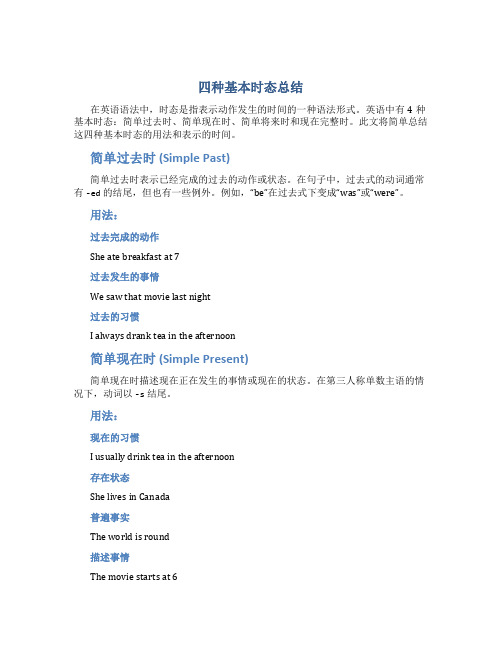
四种基本时态总结在英语语法中,时态是指表示动作发生的时间的一种语法形式。
英语中有4种基本时态:简单过去时、简单现在时、简单将来时和现在完整时。
此文将简单总结这四种基本时态的用法和表示的时间。
简单过去时 (Simple Past)简单过去时表示已经完成的过去的动作或状态。
在句子中,过去式的动词通常有-ed的结尾,但也有一些例外。
例如,“be”在过去式下变成“was”或“were”。
用法:过去完成的动作She ate breakfast at 7过去发生的事情We saw that movie last night过去的习惯I always drank tea in the afternoon简单现在时 (Simple Present)简单现在时描述现在正在发生的事情或现在的状态。
在第三人称单数主语的情况下,动词以-s结尾。
用法:现在的习惯I usually drink tea in the afternoon存在状态She lives in Canada普遍事实The world is round描述事情The movie starts at 6简单将来时 (Simple Future)简单将来时用于表示将来某个时间会发生的事情。
可以使用情态助动词will 和shall加上动词原形,也可以使用动词原形来表示未来。
用法:趋势I think gasoline prices will go up.决定或意愿I’ll help you with that homework after dinner在特定的时间或时间段内发生I’ll finish my homework by 9 PM现在完成时 (Present Perfect)现在完成时通常用于强调过去发生的事情与现在的联系。
它与简单过去时明显不同,因为它包括从过去开始,延续到现在或在过去一点时间内的动作或状态。
在句子中,现在完成时通常使用have或has和动词的过去分词。
英语完成时态的标志词

英语完成时态的标志词完成时态(Present Perfect Tense)是英语语法中的一个时态,用于描述已完成的动作或情况,通常与现在有关。
下面是一些常用的完成时态标志词:1. just - 刚刚例如:I have just finished my homework.(我刚刚完成了作业。
)2. already - 已经例如:He has already eaten breakfast.(他已经吃过早餐了。
)3. yet - 尚未例如:She hasn't finished her project yet.(她还没有完成她的项目。
)4. ever - 曾经例如:Have you ever been to China?(你曾经去过中国吗)5. never - 从未例如:I have never been to Europe before.(我以前从未去过欧洲。
)6. for - 自从例如:I have been studying English for 2 years.(我已经学英语学了2年了。
)7. since - 自从例如:He hasn't seen his family since last Christmas.(他自从去年圣诞节后就没见过家人了。
)8. recently - 最近例如:She has recently started a new job.(她最近开始了一份新工作。
)9. already - 已经例如:They have already booked their flight tickets.(他们已经订好了机票。
)10. yet - 还没有例如:We haven't received the parcel yet.(我们还没有收到包裹。
)以上是完成时态常用的标志词,它们能够帮助我们在使用完成时态时更加准确和自然。
英语语法四种完成时态
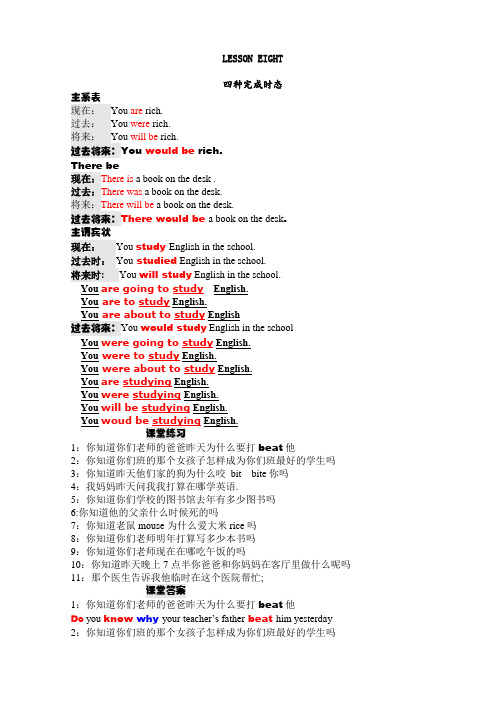
LESSON EIGHT四种完成时态主系表现在:You are rich.过去:You were rich.将来:You will be rich.过去将来:You would be rich.There be现在:There is a book on the desk .过去:There was a book on the desk.将来:There will be a book on the desk.过去将来:There would be a book on the desk.主谓宾状现在:You study English in the school.过去时:You studied English in the school.将来时: You will study English in the school.You are going to study English.You are to study English.are about to study Englishwould study English in the schoolYou were going to study English.You were to study English.You were about to study English.You are studying English.You were studying English.You will be studying English.You English.1:你知道你们老师的爸爸昨天为什么要打beat他2:你知道你们班的那个女孩子怎样成为你们班最好的学生吗3:你知道昨天他们家的狗为什么咬bit bite你吗4:我妈妈昨天问我我打算在哪学英语.5:你知道你们学校的图书馆去年有多少图书吗6:你知道他的父亲什么时候死的吗7:你知道老鼠mouse为什么爱大米rice吗8:你知道你们老师明年打算写多少本书吗9:你知道你们老师现在在哪吃午饭的吗10:你知道昨天晚上7点半你爸爸和你妈妈在客厅里做什么呢吗11:那个医生告诉我他临时在这个医院帮忙;课堂答案1:你知道你们老师的爸爸昨天为什么要打beat他Do you know why your teacher’s father beat him yesterday 2:你知道你们班的那个女孩子怎样成为你们班最好的学生吗Do you know how the pretty girl of your class becomes the best students3:你知道昨天他们家的狗为什么咬bit bite你吗Do you know why the dog of his family bit you yesterday4:我妈妈昨天问我我打算在哪学英语.Yesterday, my mother asked me where I was going to study English.5:你知道你们学校的图书馆去年有多少图书吗Do you know how many books there were in the library of your school yesterday6:你知道他的父亲什么时候死的吗Do you know when his father died7:你知道老鼠mouse为什么爱大米rice吗Do you know why the mouse loves rice8:你知道你们老师明年打算写多少本书吗Do you know how many books your teacher is going to write nest year9:你知道你们老师现在在哪吃午饭的吗Do you know where your teacher is having lunch10:你知道昨天晚上7点半你爸爸和你妈妈在客厅里做什么呢吗Do you know what your father and mother were doing in the living room at half past 7 yesterday11:那个医生告诉我他临时在这个医院帮忙;The doctor told me that he was helping in the hospital.而是对现在产生的结果和影响;否则用一般过去时态就够了;请看下面的对话;●A-We will send some one to America.我们要派一个人去美国;B-I have been there.我去过美国;= I was there and I know the country very well. Would you send me there 我去过那儿,很了解那个国家;能派我去吗C-I have not been there.我还没去过那儿呢;= I didn’t go to America. It is my turn.我没去过;这次该我了;上面对话的前提是大家都抢着去美国;所以B用现在完成时态是想说明自己有经验,派他去好;而C用现在完成时态是说自己没去过,轮也该轮到他了;两句都是强调对现在产生的影响;Did you have lunchHave you had lunchDid you study EnglishHave you studied EnglishLaochang diedLaochang has diedWho was hererWho has been hereHave you done your homework2. 表示过去发生的动作一直持续到现在;通常用于持续性较强的动词,例如:live, study, wait for, be等等,并且常常与since, for连用,since给出的是过去的一个时间点,如since 1958, 而for往往给出的是一个时间段,如for three years;●He has studied English for eight years.●Since1980, they have known each other.注:完成时态表示延续的用法不可跟非延续动词连用,如:die, go, leave, receive等;请看下面例句:╳His father has died for three years.●His father has been dead for three years.第一句是错的;“死”这个动作不可能延续;但一种状态却可以延续;第二句用主系表句型是对的;▲过去完成时态,将来完成时态和过去将来完成时态学习完成时态应注意,所有完成时态在“态”的概念上是一样的,现在完成时态、过去完成时态、将来完成时态、过去将来完成时态所不同的只是时间上的概念;所以我们只要掌握现在完成时态,然后在时间上向过去推便是过去完成时态,向将来推便是将来完成时态;3完成时态在主从句中的用法完成时态除上面讲到的两种基本用法之外,在主从句中通常可以用来表示主句与从句动作发生的先后次序;●Do you know he has finished his homework现在完成时态“has finished”表示发生在一般现在时态“know”之前;●I heard he had bought a new car.过去完成时态“had bought”表示发生在过去时态“heard”之前;现在完成时态“have had supper”强调吃过饭之后,即强调从句动作发生在主句之前;从上面几个例句可以看出,在主从句中现在完成时态往往表示发生在另一个现在时态的动作之前,而过去完成时态则表示发生在另一个过去时态的动作之前;请注意下面的例句:以上简单地介绍了在主从句中完成时态的用法;请同学们在做练习时多加注意;一、完成下列句子;1. He said 他从未去过西藏Tibet.2. 他从未给我写过信since he left Beijing.3. He said 他下月底就不用我的照相机了camera.4.I hope 雨会在明天中午前停下来.5. By the end of that year 他已集了一千多张中国邮票.6. I really don’t know他是否已经到了实验室laboratory.7. The boy knows that he must be braver and firmer在他经历了这样的事情之后.8. I could not remember whether 他已经付了字典钱.9. I’m afraid I 到时还没有找到正确的答案.10. Don’t worry. Before I get home I 就会把这件事全忘光的.二、完成下列句子;1.He said that he had never been to Tibet.他从未去过西藏Tibet.2.He hasn’t written to me他从未给我写过信since he left Beijing. 3.He said that he would have done with have used my camera by the end of next month.他下月底就不用我的照相机了camera.4.I hope that the rain will have stopped by tomorrow noon.雨会在明天中午前停下来.5.By the end of that year he had collected more than a thousand Chinese stamps.他已集了一千多张中国邮票.6.I really don’t know whether he has got to the laboratory or not.他是否已经到了实验室laboratory.7.The boy knows that he must be braver and firmer after he has experienced such a thing.在他经历了这样的事情之后. Has gonethrough8.I could not remember whether he had paid for the dictionary.他已经付了字典钱9.I’m afraid I won’t have got the correct answer by then.到时还没有找到正确的答案.10. Don’t worry. Before I get home I will have forgotten all about the matter.就会把这件事全忘光的.三、完成下列句子;1.He said 他从未去过西藏Tibet.2.他从未给我写过信since he left Beijing.3.He said 他下月底就不用我的照相机了camera.4.I hope 雨会在明天中午前停下来.5.By the end of that year 他已集了一千多张中国邮票.6.I really don’t know 他是否已经到了实验室laboratory.7.The boy knows that he must be braver and firmer 在他经历了这样的事情之后.8.I could not remember whether 他已经付了字典钱.9.I’m afraid I 到时还没有找到正确的答案.10.Don’t worry. Before I get home I 就会把这件事全忘光的.二、时态选择;该题全部取自于全国高考原卷1.—What do you want ______ those old boxes—To put things in when I move to the new flat.A. byB. forC. ofD. with2.—he start at once or wait for a while—Let him start at once.A.Will B.Would C.Does D.Shall3.I can’t tell you if it tomorrow.A.will rain B.rains C.shall rain D.does rain4.Did you watch the play on CCTV 1 last night It was really good.—No, I didn'—“Tea House”.A. What was itB. What's onC. What was it aboutD. How about it5.—Can you give me the right answer—Sorry, I _______.Would you repeat that questionA.hadn’ t listened B.haven’t listenedC.don’t listen D.wasn’t listening6.I promised to get there before 5 o’clock, but now the rain is pouring down.They_______ for me impatiently.A.may wait B.ought to waitC.could wait D.must be waiting7.—Haven't seen you for ages Do you still work in Fuzhou—'s two years since I worked there.A. Yes, I haveB. Yes, I doC. No, I haven'tD. No, I don't8.Goodbye, Peter, remember me to your parents.— ______.A. It's very kind of you to say soB. Thanks, I willC. You are so kindD. Thanks, what a good idea9.You are talking too much.—Only at home. No one ______ me but you.A. is hearingB. had heardC. hearsD. heard10.—We want someone to design the new art museum for us.—the young fellow have a tryA. MayB. ShallC. WillD. Need11.I wonder why Jenny ________us recently. We should have heard from her by now.A. hasn't writtenB. doesn't writeC. won't writeD. hadn't written12.I didn't like aunt Lucy, who _____without warning and presentingA. always turned upB. has always turned upC. was always turned upD. was always turning up13.—Has Tommy finished his homework yet—I have no idea; he it this morning.A. was doingB. had been doingC. has doneD. did14.The little girl ______ her heart out because she ______ her toy bear and believed shewasn’t ever going to find it.A. had cried; lostB. cried; had lostC. has cried; has lostD. cries; has lost15.—Hey, look where you are going—Oh, I’m terribly sorry_____________.A. I’m not noticingB. I wasn’t noticingC. I haven’t noticedD. I don’t notice16.—Do you know your town at all—No, this is the first time I _______ here.A. wasB. have beenC. cameD. am coming17.I’m sorry to keep you waiting.--Oh, not at all. I ___________ here only a few minutes.A. have beenB. had beenC. wasD. will be18.—__________ my glasses— Yes, I saw them on your bed a minute ago.A. Do you seeB. Had you seenC. Would you seeD. Have you seen19.You don’t need to describe her.I ______ her several times.A. had metB. have metC. metD. meet20.—Who is Jerry Cooper— ________ I saw you shaking hands with him at the meeting.A. Don’t you meet him yetB. Hadn’t you met him yetC. Didn’t you meet him yetD. Haven’t you met him yet21.Helen ______ her keys in the office so she had to wait until her husband _____ home.A. has left; comeB. left; had comeC. had left; cameD. left; came22.How long ________ each other before they _____ married— For about a year.A. have they known; getB. did they know; were going to getC. do they know; are going to getD. had they known; got二、时态选择;该题全部取自于全国高考原卷1.—What do you want ______ those old boxes—To put things in when I move to the new flat.A. byB. forC. ofD. withdo sth with sth or want sth with sth 意思是用什么东西或要什么东西做什么; 2.—______ he start at once or wait for a while—Let him start at once.A.Will B.Would C.Does D.Shall.Shall shall表示征求对方意见;3.I can’t tell you if it tomorrow.A.will rain B.rains C.shall rain D.does rain.will rain 表示将来发生的事;4.Did you watch the play on CCTV 1 last night It was really good.—No, I didn'—“Tea House”.A. What was itB. What's onC. What was it aboutD. How about it. What's on 意思是演的是什么;5.—Can you give me the right answer—Sorry, I _______.Would you repeat that questionA.hadn’ t listened B.haven’t listenedC.don’t listen D.wasn’t listening.wasn’t listening 表示刚才一瞬间,所以要用过去进行时;6.I promised to get there before 5 o’clock, but now the rain is pouring down.They_______ for me impatiently.A.may wait B.ought to waitC.could wait D.must be waiting.must be waiting must be or must do都可以表示对目前的推测;该话应译成:想必他们等我等的不耐烦了;Must be must be doingMust have been Must have done7.—Haven't seen you for ages Do you still work in Fuzhou—'s two years since I worked there.A. Yes, I haveB. Yes, I doC. No, I haven'tD. No, I don't7. D. No , I don't It's two years since I worked there. 此句应译成我已经有两年没在那里工作了;8.Goodbye, Peter, remember me to your parents.— ______.A. It's very kind of you to say soB. Thanks, I willC. You are so kindD. Thanks, what a good idea. Thanks, I will;在答应别人时应该用will表示坚决;9.You are talking too much.—Only at home. No one ______ me but you.A. is hearingB. had heardC. hearsD. heard9. C. hears 表示事实用一般时;10.—We want someone to design the new art museum for us.—the young fellow have a tryA. MayB. ShallC. WillD. Need. Shall shall表示征求对方的意见;have a try 试一试, have a look 看一看;11.I wonder why Jenny ________us recently. We should have heard from her by now.A. hasn't writtenB. doesn't writeC. won't writeD. hadn't written. hash' t written 因为recently表示过去延续到现在,应用过去完成时;12.I didn't like aunt Lucy, who _____without warning and presentingA. always turned upB. has always turned upC. was always turned upD. was always turning up. was always turning up,--- be always doing表示不满; 例如My wife is always watching TV. 我的妻子总是看电视; Turn up 意思是出现; 该句应译成:我不喜欢我的婶子路西总不打招呼也不带礼物就突然出现;13.—Has Tommy finished his homework yet—I have no idea; he it this morning.A. was doingB. had been doingC. has doneD. did. was doing this morning表示一个很短的过去时间,用过去进行时;14.The little girl ______ her heart out because she ______ her toy bear and believed shewasn’t ever going to find it.A. had cried; lostB. cried; had lostC. has cried; has lostD. cries; has lost. cried; had lost, cry one’s heart out 哭得很伤心;在主从句中过去完成时表示动作发生在一般过去时之前,现在完成时是指动作发生在一般现在时之前;强调主从句的时间差;15.—Hey, look where you are going—Oh, I’m terribly sorry_____________.A. I’m not noticingB. I wasn’t noticingC. I haven’t noticedD. I don’t notice15. B 表示过的动作短暂用过去进行时;16.—Do you know your town at all—No, this is the first time I _______ here.A. wasB. have beenC. cameD. am coming16. B 从过到现在的经历用现在完成时;17.I’m sorry to keep you waiting.--Oh, not at all. I ___________ here only a few minutes.A. have beenB. had beenC. wasD. will be过去的状态持续到现在用现在完成时;18.—__________ my glasses— Yes, I saw them on your bed a minute ago.A. Do you seeB. Had you seenC. Would you seeD. Have you seen18. D过去的动作对现在产生的影响用现在完成时19.You don’t need to describe her.I ______ her several times.A. had metB. have metC. metD. meet从过到现在的经历用现在完成时;20.—Who is Jerry Cooper— ________ I saw you shaking hands with him at the meeting.A. Don’t you meet him yetB. Hadn’t you met him yetC. Didn’t you meet him yetD. Haven’t you met him yet20. D 过去的动作对现在产生的影响用现在完成时;21.Helen ______ her keys in the office so she had to wait until her husband _____ home.A. has left; comeB. left; had comeC. had left; cameD. left; came动作发生在过去的过去,强调时间差用过去完成时;22.How long ________ each other before they _____ married— For about a year.A. have they known; getB. did they know; were going to getC. do they know; are going to getD. had they known; got动作发生在过去的过去,强调时间差用过去完成时;。
过去完成时现在完成时将来完成时课件 高三英语语法
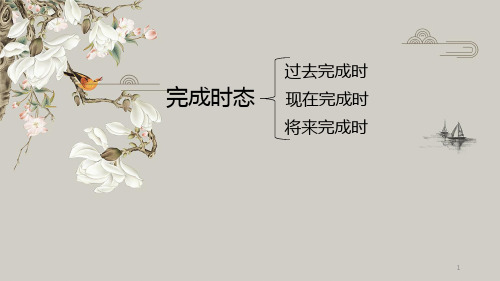
2. 过去完成时的用法:总的来说,过去完成时表示“过去的过去” ① 表示在过去某一时间或动作之前已经发生或完成了的动作。 The film had been on for 5minutes when I arrived at the cinema. I had finished my homework before I began to watch TV. ② 表示从过去某一时间开始,持续到过去另一时间的动作或状态。 Mr. Li had taught English for 8 years in China before he came to America.
10
单项选择
1. --Who will go to the station to meet Lorry?
--I will. I __B___ her several times.
A. met B. have met C. had met D. will meet
2. How long have you __D_____ here?
7
③ 用于一些固定句型,如hardly...when..., no sooner...than..., it was the first time that... Hardly had he seen me when he ran away. I had no sooner reached home than it began to rain. It was the first time this year that he hadn’t worked on a Saturday.
英语语法-时态简洁版

现在进行时:am/is/are +现在分词
1.表示现在正在进行的动作。 ►. The workers are building a new bridge across the river. 2.表现阶段正进行的动作 We are preparing for our final examination this week. 3.go, come, leave, arrive, land, meet, die, start, return, join, etc. 用于进行时态时表示即将 开始的动作。 ►. Look! The bus is coming.
一般现在时
(4)表将来:
A.在由when,after, before,as,as soon as,
although,because,if,even if,in case,till,until ,unless,so long as,where,whatever,wherever 等引导的状语从句中用一般现在时表将来发生的动作。 (黄金重点!) eg.:►. Whatever happens, you should keep coolheaded. (不错的句型!) ►. I'll be right here waiting for you wherever you go. (很感人的句型!)
初中英语语法 现在完成时
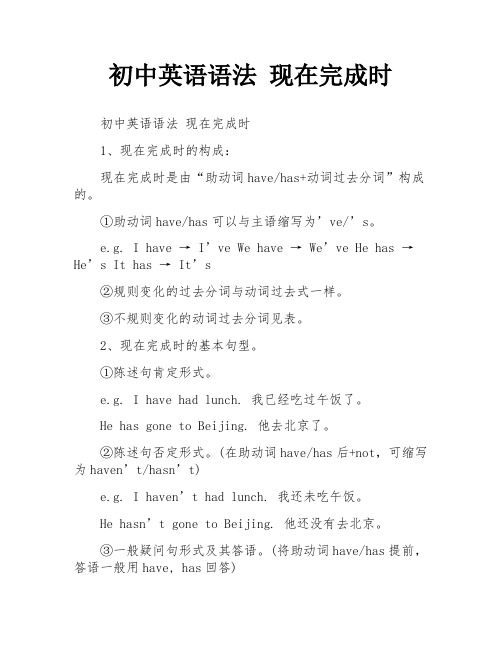
初中英语语法现在完成时初中英语语法现在完成时1、现在完成时的构成:现在完成时是由“助动词have/has+动词过去分词”构成的。
①助动词have/has可以与主语缩写为’ve/’s。
e.g. I have → I’ve We have → We’ve He has → He’s It has → It’s②规则变化的过去分词与动词过去式一样。
③不规则变化的动词过去分词见表。
2、现在完成时的基本句型。
①陈述句肯定形式。
e.g. I have had lunch. 我已经吃过午饭了。
He has gone to Beijing. 他去北京了。
②陈述句否定形式。
(在助动词have/has后+not,可缩写为haven’t/hasn’t)e.g. I haven’t had lunch. 我还未吃午饭。
He hasn’t gone to Beijing. 他还没有去北京。
③一般疑问句形式及其答语。
(将助动词have/has提前,答语一般用have, has回答)e.g. Have you had lunch? 你吃过午饭了没? Yes, I have. No, I haven’t.Has he gone to Beijing? 他去过北京了没有? Yes, he has. No, he hasn’t.否定回答还可以用:No, not yet. / No, never. / No, not even once等。
④特殊疑问句形式。
(疑问词+一般疑问句)e.g. Where has he gone? 他去了哪里?3、现在完成时的三个基本用法。
(1) 现在完成时的第一个基本用法表示过去发生或已完成的某一个动作对现在造成的影响或结果。
e.g. Have you had lunch? Yes, I have. I’ve just had it. 你吃过午饭没?有,吃过了,我刚刚吃的。
(影响及结果:我现在饱了,不需要了)He has gone to Beijing. 他已经去北京了。
英语各种时态的构成

英语各种时态的构成英语时态是英语语法中的重要部分,它表示动作发生的时间和状态。
以下是各种时态的构成:1. 一般现在时态:表示经常发生的动作或存在的状态。
基本形式为动词原形,第三人称单数时在动词后面加-s/-es。
例如:I read books every day.2. 现在进行时态:表示正在进行的动作。
基本形式为be动词+动词ing形式。
例如:He is reading a book now.3. 现在完成时态:表示已经完成的动作或存在的状态。
基本形式为have/has+过去分词。
例如:I have read the book already.4. 现在完成进行时态:表示刚刚完成的动作。
基本形式为have/has been+动词ing形式。
例如:He has been working hard all day.5. 一般过去时态:表示过去的动作或存在的状态。
基本形式为动词过去式。
例如:She read a book yesterday.6. 过去进行时态:表示过去正在进行的动作。
基本形式为was/were+动词ing形式。
例如:They were playing basketball at 3 o’clock yesterday afternoon.7. 过去完成时态:表示过去的某个时间之前已经完成的动作。
基本形式为had+过去分词。
例如:They had finished their homework before dinner.8. 过去完成进行时态:表示过去的某个时间之前一直在进行的动作。
基本形式为had been+动词ing形式。
例如:He had been waiting for the bus for hours when I arrived.。
高中英语语法- 动词时态-- 完成时
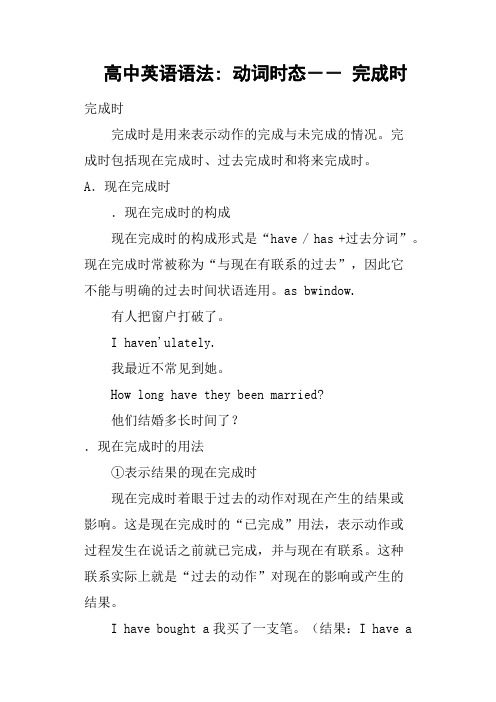
高中英语语法: 动词时态--完成时完成时完成时是用来表示动作的完成与未完成的情况。
完成时包括现在完成时、过去完成时和将来完成时。
A.现在完成时.现在完成时的构成现在完成时的构成形式是“have / has +过去分词”。
现在完成时常被称为“与现在有联系的过去”,因此它不能与明确的过去时间状语连用。
as bwindow.有人把窗户打破了。
I haven'ulately.我最近不常见到她。
How long have they been married?他们结婚多长时间了?.现在完成时的用法①表示结果的现在完成时现在完成时着眼于过去的动作对现在产生的结果或影响。
这是现在完成时的“已完成”用法,表示动作或过程发生在说话之前就已完成,并与现在有联系。
这种联系实际上就是“过去的动作”对现在的影响或产生的结果。
I have bought a我买了一支笔。
(结果:I have apen now.)Tature has increased by 10℃.温度上升了10摄氏度。
(结果:It is quw.)Air pollution has talives of many people.空气污染已经夺去了很多人的生命。
(结果:Air polluvus now.)注意:现在完成时的上下文所指的时态必须呼应。
【误】I have bought a pen but I have lw.(have bought表示你现在已经有笔了,这和后面的have lost 有矛盾)【正】I bought a pen but I have lw.我(过去)买了一支笔,但我已经把它丢了。
【误】I have lbut I have found it now.(have lost 强调你现在已经没有笔了,与后面have found的意思有冲突)【正】I lbut I have found it now我丢了一支笔,但现在已经找到了。
②表示经历的现在完成时强调过去某一时刻到说话时这段时间中的经历。
- 1、下载文档前请自行甄别文档内容的完整性,平台不提供额外的编辑、内容补充、找答案等附加服务。
- 2、"仅部分预览"的文档,不可在线预览部分如存在完整性等问题,可反馈申请退款(可完整预览的文档不适用该条件!)。
- 3、如文档侵犯您的权益,请联系客服反馈,我们会尽快为您处理(人工客服工作时间:9:00-18:30)。
LESSON EIGHT四种完成时态主系表现在:You are rich.过去:You were rich.将来:You will be rich.过去将来:You would be rich.There be现在:There is a book on the desk .过去:There was a book on the desk.将来:There will be a book on the desk.过去将来:There would be a book on the desk.主谓宾状现在:You study English in the school.过去时:You studied English in the school.将来时: You will study English in the school.You are going to study English.You are to study English.are about to study Englishwould study English in the schoolYou were going to study English.You were to study English.You were about to study English.You are studying English.You were studying English.You will be studying English.You1:你知道你们老师的爸爸昨天为什么要打beat他?2:你知道你们班的那个女孩子怎样成为你们班最好的学生吗?3:你知道昨天他们家的狗为什么咬bit bite你吗?4:我妈妈昨天问我我打算在哪学英语.5:你知道你们学校的图书馆去年有多少图书吗?6:你知道他的父亲什么时候死的吗?7:你知道老鼠mouse为什么爱大米rice吗?8:你知道你们老师明年打算写多少本书吗?9:你知道你们老师现在在哪吃午饭的吗?10:你知道昨天晚上7点半你爸爸和你妈妈在客厅里做什么呢吗?11:那个医生告诉我他临时在这个医院帮忙。
课堂答案1:你知道你们老师的爸爸昨天为什么要打beat他?Do you know why your teacher’s father beat him yesterday?2:你知道你们班的那个女孩子怎样成为你们班最好的学生吗?Do you know how the pretty girl of your class becomes the best students? 3:你知道昨天他们家的狗为什么咬bit bite你吗?Do you know why the dog of his family bit you yesterday?4:我妈妈昨天问我我打算在哪学英语.Yesterday, my mother asked me where I was going to study English.5:你知道你们学校的图书馆去年有多少图书吗?Do you know how many books there were in the library of your school yesterday? 6:你知道他的父亲什么时候死的吗?Do you know when his father died?7:你知道老鼠mouse为什么爱大米rice吗?Do you know why the mouse loves rice?8:你知道你们老师明年打算写多少本书吗?Do you know how many books your teacher is going to write nest year?9:你知道你们老师现在在哪吃午饭的吗?Do you know where your teacher is having lunch?10:你知道昨天晚上7点半你爸爸和你妈妈在客厅里做什么呢吗?Do you know what your father and mother were doing in the living room at half past 7 yesterday?11:那个医生告诉我他临时在这个医院帮忙。
The doctor told me that he was helping in the hospital.而是对现在产生的结果和影响。
否则用一般过去时态就够了。
请看下面的对话。
●A-We will send some one to America.我们要派一个人去美国。
B-I have been there.我去过美国。
= I was there and I know the country very well. Would you send me there?我去过那儿,很了解那个国家。
能派我去吗?C-I have not been there.我还没去过那儿呢。
= I didn’t go to America. It is my turn.我没去过。
这次该我了。
上面对话的前提是大家都抢着去美国。
所以B用现在完成时态是想说明自己有经验,派他去好。
而C用现在完成时态是说自己没去过,轮也该轮到他了。
两句都是强调对现在产生的影响。
Did you have lunch?Have you had lunch?Did you study English?Have you studied English?Laochang died?Laochang has died?Who was herer?Who has been here?Have you done your homework2. 表示过去发生的动作一直持续到现在。
通常用于持续性较强的动词,例如:live, study, wait for, be等等,并且常常与since, for连用,since给出的是过去的一个时间点,如since 1958, 而for往往给出的是一个时间段,如for three years。
●He has studied English for eight years.●Since1980, they have known each other.注:完成时态表示延续的用法不可跟非延续动词连用,如:die, go, leave, receive等。
请看下面例句:╳His father has died for three years.●His father has been dead for three years.第一句是错的。
“死”这个动作不可能延续。
但一种状态却可以延续。
第二句用主系表句型是对的。
▲过去完成时态,将来完成时态和过去将来完成时态学习完成时态应注意,所有完成时态在“态”的概念上是一样的,现在完成时态、过去完成时态、将来完成时态、过去将来完成时态所不同的只是时间上的概念。
所以我们只要掌握现在完成时态,然后在时间上向过去推便是过去完成时态,向将来推便是将来完成时态。
3完成时态在主从句中的用法完成时态除上面讲到的两种基本用法之外,在主从句中通常可以用来表示主句与从句动作发生的先后次序。
●Do you know he has finished his homework?现在完成时态“has finished”表示发生在一般现在时态“know”之前。
●I heard he had bought a new car.过去完成时态“had bought”表示发生在过去时态“heard”之前。
现在完成时态“have had supper”强调吃过饭之后,即强调从句动作发生在主句之前。
从上面几个例句可以看出,在主从句中现在完成时态往往表示发生在另一个现在时态的动作之前,而过去完成时态则表示发生在另一个过去时态的动作之前。
请注意下面的例句:以上简单地介绍了在主从句中完成时态的用法。
请同学们在做练习时多加注意。
一、完成下列句子。
1. He said (他从未去过西藏Tibet).2. (他从未给我写过信)since he left Beijing.3. He said (他下月底就不用我的照相机了camera).4.I hope (雨会在明天中午前停下来).5. By the end of that year (他已集了一千多张中国邮票).6. I really don’t know(他是否已经到了实验室laboratory).7. The boy knows that he must be braver and firmer(在他经历了这样的事情之后).8. I could not remember whether (他已经付了字典钱).9. I’m afraid I (到时还没有找到正确的答案).10. Don’t worry. Before I get home I (就会把这件事全忘光的).二、完成下列句子。
1.He said that he had never been to Tibet.(他从未去过西藏Tibet).2.He hasn’t written to me(他从未给我写过信)since he left Beijing.3.He said that he would have done with (have used) my camera by the end of next month.(他下月底就不用我的照相机了camera).4.I hope that the rain will have stopped by tomorrow noon.(雨会在明天中午前停下来).5.By the end of that year he had collected more than a thousand Chinese stamps.(他已集了一千多张中国邮票).6.I really don’t know whether he has got to the laboratory or not.他是否已经到了实验室laboratory).7.The boy knows that he must be braver and firmer after he has experienced such a thing.(在他经历了这样的事情之后). Has gonethrough8.I could not remember whether he had paid for the dictionary.(他已经付了字典钱)9.I’m afraid I won’t have got the correct answer by then.(到时还没有找到正确的答案).10. Don’t worry. Before I get home I will have forgotten all about the matter.(就会把这件事全忘光的).三、完成下列句子。
